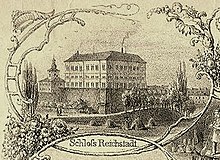Reichstadt Agreement

The Reichstadt Agreement was an agreement made between
The later Budapest Convention of 1877 confirmed the main points, but when the war concluded with the Treaty of San Stefano in 1878, the terms of the treaty were quite different, which led to Austro-Hungarian insistence on convening a revision at the Congress of Berlin later that year. Those events laid the background for the subsequent Bulgarian Crisis of 1885-1888 and ultimately World War I.[1][2][3][4]
Format
The negotiations took place in a private and almost informal setting. It is significant that the results of the meeting were not written down and so the Austro-Hungarian and the Russian views of what was agreed on differed significantly.
There was never a signed formal convention or even a signed protocol. The minutes were dictated separately by both Andrássy and by Gorchakov, which suggests that neither side really trusted each other. The extent of the agreed Austro-Hungarian annexation in Bosnia and Herzegovina has remained controversial. It was those inconsistencies that necessitated further discussions at the Constantinople Conference and the subsequent Budapest Convention, but they largely confirmed or amended the Reichstadt discussions.
Terms
The
Austria-Hungary would allow Russia to make gains in Bessarabia and the Caucasus.
Russia would allow Austria-Hungary to gain Bosnia.
Russia and Austria-Hungary would not create a large Slavic state in the Balkans.
Implications
The agreement effectively meant that Austria-Hungary was assuring Russia that it would stay out of a war between Russia and the Ottoman Empire. It also meant that Austria-Hungary and Russia were agreeing on how the Balkans would be divided in the case of a Russian victory.
-
Andrássy
-
Franz Joseph
-
Alexander II
-
Gorchakov
See also
References
- ISBN 9780521442299.
- ISBN 9781557530653.
- ^ Mikulas Fabry. The Idea of National Self-Determination and The Recognition of New States at The Congress Of Berlin (1878) Archived 2008-06-21 at the Wayback Machine. ISA Annual Convention, New Orleans, March 24–27, 2002
- ^ Pribram, Alfred, ed. (1921). The Secret Treaties of Austria-Hungary. Vol. 2. Harvard University Press.




